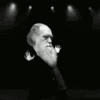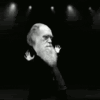Autobiography
When Darwin sat down to write his autobiography - more for his children's sakes than because he thought anyone outside his immediate family would be interested - he was 67 years old. He had travelled around the world, he had met the elite of 19th century English thinkers, he had published a number of books including at least two which would still be widely read 150 years later, and revolutionised the field of science in general and biology in particular.
After all this, he managed 120 pages of autobiography, almost half of which describes his childhood and teen years.
In other words,
Autobiography neither is nor tries to be the ultimate word on the life of Charles Darwin. For most of the book, he simply relates the facts of his life, his friends and family and his work, without doing much to try and put it in context, draw conclusions or reveal secrets - or even discern between harmless anecdotes and important events; he spends almost as much on stealing apples as a child as he does on his 5-year trip around the world on the
Beagle. (Though to be honest, the latter is because he'd already published an account of that and didn't want to repeat himself.)
Darwin comes across as a genuinely humble guy, who acknowledges that he's done something huge but isn't out to defend his conclusions or parade his knowledge; he's already done that in his other books, and now he just briefly tells us why he came to be interested in biology, how he started questioning prevailing attitudes, and how he drew his conclusions and wrote his books (and he says very little about the 20-year wait before he dared publish
Origin of Species). He's as calmly objective about himself as he is about his findings; it's all in a day's work.
Whenever I have found out that I have blundered, or that my work has been imperfect, and when I have been contemptuously criticised, and even when I have been overpraised, so that I have felt mortified, it has been my greatest comfort to say hundreds of times to myself that "I have worked as hard and as well as I could, and no man can do more than this." I remember when in Good Success Bay, in Tierra del Fuego, thinking (and, I believe, that I wrote home to the effect) that I could not employ my life better than in adding a little to Natural Science. This I have done to the best of my abilities, and critics may say what they like, but they cannot destroy this conviction.
The result is a well-written, if not terribly fascinating book; the kind of autobiography that tells you more about its subject by what it leaves out than by what it includes. I'm sure there are better accounts of his life and the importance of his work; hearing ol' Chuck himself tell it, you'd almost think he did no more than invent a better mousetrap. But hey, if you're interested in a look inside the mind of the man who basically came up with the idea that mice could be caught at all, you could do a lot worse.






